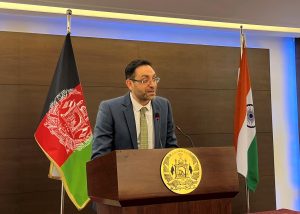A few days after hundreds of Afghan students living in India staged a protest in New Delhi, demanding that their visas be extended and they be allowed to work in India, the Indian government announced 1,000 new scholarships for Afghan students for the 2023-24 academic year. The Indian Council for Cultural Relations, the implementing agency which is a part of the Ministry of the External Affairs (MEA), said that India “remains steadfast in its commitment to bolstering Afghan students’ educational pursuits.”
However, the reality is that, for Afghans, applying for or renewing their Indian visas, whether for education or medical purposes, has become a challenge. For the last two years, India had downscaled the scholarship program that allowed thousands of Afghan students to pursue their education in India. In some cases, release of the monthly scholarship amount has been withheld, and letters have been sent to the unlucky students informing them of the expiry of their visa.
Amid the announcement of new scholarships, Indian policy on these thousands of students still remains ambiguous. It is also unclear if India will start issuing medical visas to Afghans in the coming months. By not doing so, India runs the risk of frittering the social capital and goodwill it had accrued in the last two decades of development assistance to Afghanistan.
Ever since the Taliban captured power, New Delhi has been juggling with different sets of ideas and experiments about how to frame its policies toward the country, where it wielded immense influence prior to August 2021. India proclaims that it is still committed to providing humanitarian assistance to the Afghans. That is rather an easy option, given India’s long experience of running such programs in the war-torn country. However, the present policy dilemma of whether to engage or recognize the Taliban is a different and difficult choice.
While no actual policy statement has ever been made by the MEA in this regard, a sum total of its past actions indicate that New Delhi favors a cautious middle path, avoiding media headlines, and yet pursuing realism that is not besieged by idealistic principles.
For several months after the fall of Kabul, the Afghan embassy in New Delhi remained a symbol of resistance to the Taliban. The flag of the Islamic Republic of Afghanistan, and not that of the Taliban, flew atop its building. The ambassador’s tweets were openly critical of the Taliban policies. Consequently, as funding from the Taliban government dried up, the MEA stepped in to support the embassy’s operations.
That slowly started changing as India began engaging the Taliban, first by setting up a three-diplomat-strong technical mission in Kabul to oversee its humanitarian assistance in June 2022. Perhaps the Taliban were amenable to the “technical mission” venturing into the regular activities of an embassy, such as providing humanitarian assistance, gathering intelligence, and the very latest, restarting the scholarship program. These were, however, not without reciprocal expectations.
In late 2022, the Islamic Emirate started pushing for stationing of its representative at the Afghan embassy in New Delhi. The man proposed for the post was Abdul Qahar Balkhi, a controversial spokesperson for the Islamic Emirate’s foreign ministry with a history of intimidating journalists with death threats. The MEA sought to sidestep the complex challenge by not acceding to the request.
Subsequently, the Taliban tried finding another way to affect a leadership change at the embassy in New Delhi – this time by instigating a mini coup. In May, it recalled Afghan Ambassador Farid Mamundzay and appointed the trade counselor, Qadir Shah, as the chargé d’affaires in his place. As Shah tried to take over the affairs of the embassy, Mamundzay reportedly prevailed and officials of the Afghan embassy “categorically rejected” Shah’s efforts to take charge of the mission. Although Shah has been barred by the embassy from entering the premises, Mamundzay too has been on leave and is reportedly out of the country.
The MEA has decided to play it safe, terming the entire incident an internal affair of the embassy. The current status of the embassy and its stand vis-à-vis the Taliban remains unclear, but it is no longer critical of the Islamic Emirate.
New Delhi indeed faces a Hobson’s choice in Afghanistan. Taking an anti-Taliban stance seriously hampers execution of all its present and future projects in that country, including the task of its “technical mission.” In the past few months, Taliban officials have welcomed India’s “diplomatic upgrade” in Kabul, requested India to complete its development projects, have offered security to its mission, and have even asked New Delhi to train their security personnel.
India has responded cautiously, opting for a case by case approach to keep the Taliban in good humor. Apart from continuing with its humanitarian assistance, the MEA included Taliban foreign ministry officials in an online training course. It has also offered technical support to the Afghan banking sector. However, New Delhi still remains wary of a full-scale engagement with the Islamic Emirate, which would indirectly mean endorsing the regressive policies of the Taliban regime.
It is, however, unclear if this cautious policy would change in the coming days, given the rapid growth in Chinese-Taliban relations. On September 13, Beijing named a new ambassador for Kabul, who was accorded a ceremonious welcome by the Taliban. While New Delhi may take comfort from the fact that no single nation is capable of meeting all of Afghanistan’s needs, a strong Chinese and Pakistani presence in that country would certainly tilt the balance and minimize the space for any substantial Indian involvement.

































